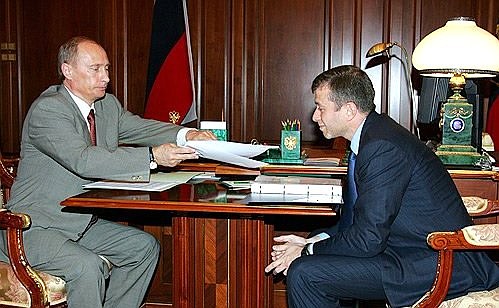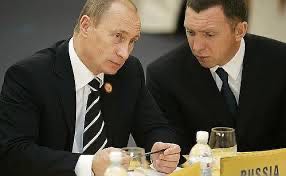The United States’ latest round of sanctions has hit Russia hard. In the future, the Russian state will have to share the emerging risks and minimize socioeconomic consequences for the impacted regions and industries. This will lead to a new wave of property redistribution based upon state — not economic — interests.
America’s latest round of sanctions has proven to be one of the most powerful blows against Russia since 2014. It has impacted not only government officials, but also influential business elite. And the shockwaves won’t stop there: the newest sanctions will affect budget and tax policies, property distribution, relations between government and the business community, macroeconomic indicators, and the public’s sense of social well-being.
But there will also be important indirect consequences. Amplified by domestic political trends, the sanctions may serve as the impetus for a new wave of property redistribution based upon state — rather than economic — interests.

Gennadi Timchenko (left) and Arkadi Rotenberg, close friends of the president (foto Kremlin.ru)
Russia has a long and controversial history of property redistribution. During the privatization of the 1990s, a group of businessmen grew fantastically wealthy — often at the expense of the broader public — and began using their finances to affect political change. When Vladimir Putin became president in 2000, one of his first orders of business was to reign them in. He forced the so-called “oligarchs” to submit to his regime and refrain from exerting influence on politically important issues.
The business community could now discuss tax and budget policies, preferential treatment, and other routine questions with the government, but it was forbidden to raise issues like constitutional reform, Russia’s relations with the West, human rights, or freedom of speech. In other words, all issues that concerned power rather than property redistribution were off limits.
Much of the 2000s Russian business community chose to comply with the Putin regime’s demands: these businessmen steered clear of political issues, kept a low profile, but weren’t overly patriotic. When asked to contribute to politically important projects, they graciously obliged. They saw this as political tribute; they were paying for stability and minimizing their risk of conflict with the state.
Not all businessmen are trustworthy
Today, however, the Putin administration sees these entrepreneurs as not completely trustworthy. Putin and his entourage — particularly those from the security services — view the 1990s privatization of state assets as unfair and an irreparable consequence of the Russian state’s weakness under President Boris Yeltsin. And although Putin has repeatedly opposed revisiting privatization’s outcomes, that does not mean he considers them legitimate.
As a result, these businessmen have always feared losing their property, while the so-called 'collective Putin' has feared their disloyalty. And conservatives in Putin’s circle see these oligarchs — who have no intrinsic ties to the state’s current strategic interests — as potential allies of the West.
At a time of increasing sanctions pressure, these businessmen are the most vulnerable. They lack powerful proteges inside Putin’s regime, can actively communicate with the West to minimize their risks, and behave pragmatically, trying to maximize their returns, rather than adapt to political needs. They command a lot of resources but have little political influence.
In peacetime, this would not be a problem. But when Putin’s elite believes the country is in a state of geopolitical war, the regime will inevitably be tempted to take control of resources it feels were distributed with no concern for state priorities.
Partners of Putin
Not all oligarchs are so distrusted by the authorities. Others have chosen a different survival strategy since 2000: they don’t simply follow the rules of the game, but also form coalitions with Putin’s close associates. One such person is Alexey Mordashov, who invested in Russia’s largest media empire, National Media Group, alongside Putin insider Yury Kovalchuk and the Surgutneftegas energy company. NMG appeared in 2008 and became an influential player on Russia’s domestic news market as well as an effective marriage of 1990s capital and Putin’s political resources.
Leonid Mikhelson is another example. He is the only major private entrepreneur to remain on Russia’s gas market after Gazprom started acquiring and pushing out all independent producers. His Novatek company initially surrendered 19.9 percent of its stock to Gazprom. However, that didn’t provide the desired security guarantees. But once Mikhelson made Putin ally Gennady Timchenko his partner in 2009, the company’s relations with foreign investors improved markedly and political risks disappeared.
Yet even these businessmen are growing vulnerable. Now, however, it’s their toxic political partners that pose a threat. For example, Timchenko was forced to leave Novatek to minimize the company’s sanctions risk, although he managed to retain his stake through his Volga Group.
Mordashov is in a notably better position, since Kovalchuk is not part of his metallurgical business. On the other hand, the Trump Administration is not exclusively motivated by political factors. Oleg Deripaska, whose business was hit by the last round of sanctions, had no business partners with connections to Putin, but was singled out for his company Rusal’s role on the U.S. aluminum market at a time when Trump wants to ramp up domestic production.
Thus, a politically influential partner with close ties to the president does protect a company from the security structures’ aggressive designs and helps it grow inside the country. But increased sanctions pressure will test the strength of the alliance between Putin’s friends and the oligarchs and make this business model more vulnerable in the eyes of competitors and foreign investors.
Yeltsin-era oligarchs
The most intriguing group among Russia’s top property owners are people like Deripaska, Roman Abramovich, and Alisher Usmanov — Yeltsin-era oligarchs who have helped manage a crisis or resolve an issue to gain the Kremlin’s favor.

Roman Abramovich as governor of Chukotka. Picture Wikimedia
After a conflict with the U.S. many years ago, Deripaska adopted an anti-American position that helped to bring his political and corporate interests closer to the Russian president. Abramovich also assisted Putin: he took part in the Yukos case against oligarch Mikhail Khodorkovsky, agreed to head the remote Chukotka region, and financed Russian soccer. And Usmanov controls important communications resources — particularly the VKontakte social network — that were seized from uncooperative owners.
These businessmen are politically important, which means they are probably insured against worst case scenarios like property confiscation and incarceration. However, that doesn’t necessarily mean they will remain unscathed forever.
Deripaska’s case will soon provide an example of how the Kremlin intends to rescue the sanctioned businessmen. In any case, it can only provide limited assistance. And that will become increasingly difficult as more and more companies find themselves on the sanctions list.
The government is currently discussing 'domestic offshores', tax breaks, and loans. But these strategies cannot be applied across the board. As an alternative, property can be redistributed in favor of the state or an economic entity acting as the agent of the state. While Deripaska’s political weight may ensure his basic interests will be considered, the state cannot guarantee the existence and success of his business after sanctions.
President Poetin en Oleg Deripaska (foto Kremlin.ru)
Subservient to the Kremlin
Finally, in the last 18 years, a new class of oligarchs unconnected to the Yeltsin era has emerged: the president’s close associates, entrusted with managing large assets. This elevates them to a special position within Russia’s ruling elite. These oligarchs have a limited reign; as a rule, they merely manage state assets (for instance, Igor Sechin at the Rosneft state-controlled oil company or Sergei Chemezov at Rostec state technology company). Even if they own their assets (like Timchenko and Kovalchuk), their incomes entirely depend on proximity to the state and state-owned companies.
Such dependence also implies limited political influence. Unlike the oligarchs of the 1990s who directly participated in making political decisions, the current state-affiliated oligarchs influence a limited number of issues and are subservient to the state.
Putin’s oligarchs may see the sanctions as an opportunity to cling even closer to the state, rather than as a threat. After all, their key assets are not the companies that they manage, but being integrated into the regime’s system of perks. Therefore, stronger pressure from the West could mean their deeper integration into political processes.
Meanwhile, the government will primarily be concerned with the state of large enterprises rather than with the oligarchs’ well-being. The failure of these enterprises could trigger serious socioeconomic consequences on a regional or even federal scale.
Business and the logic of war
Regardless of which companies and individuals will find themselves on the sanctions list in the future, the state will have to share emerging risks and minimize socioeconomic consequences for the impacted regions and industry sectors. This will lead to another round of property redistribution: the toxic actors will cede power to those with greater capabilities to solve the current problems. In other words, those closer to the state — and not necessarily Putin’s friends — will reap the benefit.
The state will also focus on reversing macroeconomic risks like currency market instability, inflation, the decline of personal incomes, and other systemic challenges associated with the sanctions. This is no less important than bailing out particular businesses.
But economic liberalization will pose a particular dilemma to the state. Should private economic entities get more freedom or should the state control everything? The question will be framed as a choice between economic development and geopolitical confrontation, between reforms and security.
This will tempt the president to select between the economy and the state. But should the choice be formulated this way, then the decision has already been made: the logic of war has triumphed over development.
This article was originally published by Carnegie Center Moscow.

